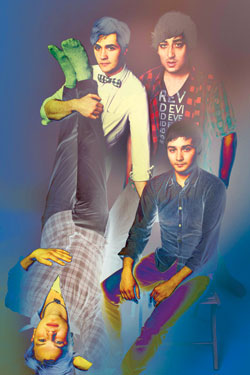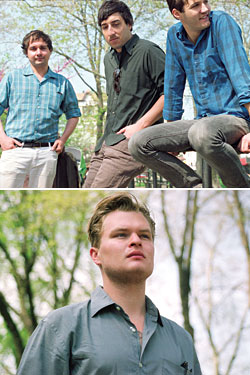
It’s dusk on South First Street in Williamsburg, and the members of Grizzly Bear are sitting down to dinner at Rye, a new pre-Prohibition-themed restaurant. The place is not officially open to the public yet, but the hostess greets front man Ed Droste warmly (he was here for drinks the other night). Each band member—Droste, producer-bassist Chris Taylor, drummer Chris Bear, and guitarist-vocalist Daniel Rossen—listens attentively as the waitress describes the specials. When she’s gone, the conversation turns serious. “Normally, I would just dive right into that quail,” Droste says to the table, “but I had some tacos a couple of hours ago. You know, a late lunch.” Everyone agrees that the halibut entrée sounds enticing, but would it be too much food? The waitress comes back with a tray of cocktails and a glass of rosé for Taylor. He picks the glass up by its base, swirls the wine, sips it, makes a face like he’s just snorted a pixie stick, and nods vigorously. “Robust!” he exclaims. As long as the waitress is here, she might as well address Droste’s quail issue. “Did you say the quail is small?” the singer inquires. “Yeah. It’s quail-sized,” she deadpans. Everyone laughs. In the end, each Grizzly Bear orders the beet salad to start, followed by a light entrée. When the salads arrive, they discuss how this move will appear to New York Magazine readers. “We should do an online poll: ‘On a scale of one to ten, how lame is it that they all ordered the beet salad?’ ” Droste jokes, aware of the incongruity of being foodie rockers. “It’s really good, though,” Taylor says. “I don’t regret it.”
The members of Grizzly Bear have never worried about seeming lame, which may be why people think they’re cool. The band’s first album, 2004’s Horn of Plenty, came out at a moment when it was good to be weird and from Brooklyn. Fans hooked on the defiant inscrutability of Animal Collective or the dense soundscapes of TV on the Radio were quick to embrace a similarly adventurous but more intimate sound. By the time they released Yellow House, in 2006, Grizzly Bear’s first album with all four current members, it became clear they were not just the latest quirky collective. Their songs had the egghead production of art-school bands like Talking Heads and the complex vocal harmonies of a Baroque choir but were driven by irresistibly sweet pop melodies. Their third album, Veckatimest, out later this month, perfects this hybrid. In the same way that the band members themselves exude a beguiling purity of spirit—they’re cheerful yuppie nerds, not brooding hipsters—so does Veckatimest exude a basic human warmth that is deeply seductive.
All four members of Grizzly Bear went to New York University. Taylor, who has a passing resemblance to actor Michael Pitt, lived across the hall from Rossen during their freshman year. Sophomore year, Taylor met Bear—the good-natured, boyish jokester of the group—through “jazz stuff we were both playing,” says Taylor. He mentioned his new friend Chris Bear to the soft-spoken, observant Rossen, and that’s when they realized Rossen had gone to jazz camp with Bear when they were teenagers. The members of Grizzly Bear seem to have been gravitating toward each other all their lives.
Droste, who is gay, has dark Cary Grant hair, broad shoulders, and a geeky suaveness—he can wear knee-length cutoff shorts without looking like an idiot. The singer grew up in Boston and comes from a long line of the musically gifted. His maternal grandfather was head of the music department at Harvard, his aunt is a classically trained cellist, and his mother taught music at a Boston elementary school. In high school, he learned to play guitar and started writing his own songs. After college, he taught and volunteered in Zimbabwe and studied art in Italy and Greece. “It was a seeing-the-world thing,” he says. The wayward-student lifestyle wasn’t conducive to lugging a guitar around, so Droste quit playing. It was only when he returned to the States and was in his last year at NYU’s Gallatin School that he reconnected with songwriting.
Droste’s voice is a full-bodied, multi-octave-reaching instrument reminiscent of the more-earnest end-of-eighties New Wave (think Curt Smith from Tears for Fears or a less-campy Morrissey), but it took him a while to feel confident about it. “I was insecure about the songs, about my voice,” Droste remembers. “I was fearful of judgment and fearful of what people would think and just generally fearful.”
He persevered and wrote a collection of tortured and creepy but very beautiful songs. He was working in a documentary studio when he met Bear, who was studying music at NYU and understood the technical side of recording, through a mutual friend. Droste asked him to help him complete what would become Horn of Plenty (Bear co-wrote one song, helped clean up the recordings, and added some drums). “That album is this weird faded Polaroid of my past,” Droste says. “It was like releasing demos. The songs felt fully realized at the time because I didn’t really know what I was doing, but in retrospect, I’m like, ‘Oh my God, those songs are crazy! What the hell is going on?’ ”

As incomplete as the material on the band’s debut now sounds, it defines Grizzly Bear’s ethos: intricately arranged music made accessible by the simple structure underneath. For a debut album on a tiny label by an unknown artist, Horn of Plenty got tons of critical notice, gushed over by influential music sites like Pitchfork. But more significant was the reaction of fellow musicians. A year or so after Horn of Plenty came out, the label Kanine reissued the record as a double album featuring a second disk composed entirely of remixes by arty and well-known musicians (Final Fantasy, Dntel) and arty but not-so-well-known musicians (Simon Bookish, Phiiliip’s Overflowing Trophy Case). Just as fans form a fiercely personal attachment to this music, other bands find putting their own mark on a Grizzly Bear tune to be really satisfying. Owen Pallett, a.k.a. Final Fantasy, tried to explain how he was instantly won over by the band: “I ducked into Piano’s and was surprised to see them playing. I’m not exactly sure what caused the magic. I think, like for most people, it’s pretty stunning to hear something that you’ve always wanted but never knew existed.”
The remix album’s success put Droste in the center of the emerging Brooklyn scene, though he does not like to talk about it. “We really hate commenting about, like, our stature,” Droste explains. “Because if you’re talking about being in the scene and being a leader and self-referencing in this weird ranking system of how big you are or how small you are or who likes you, it inherently sounds douchey.”
Grizzly Bear were hailed as representing a movement before they even had a clear idea of the music they wanted to make. “Our first label put freak-folk in our bio,” Droste says, “and the next thing you know, it was like, ‘Do you know Devendra?’ And it’s like, ‘Uh, I think he moved to L.A.’”
In order to perform live, Droste needed a band; Taylor came on board first in 2005, then Rossen. But they weren’t merely hired hands—Droste wanted musicians who could help him expand his horizons and overcome his insecurities. “I’m not an instrumentalist,” he says. “I never wanted to perform solo. I wanted to be in a band.”
The foursome descended on Droste’s childhood home in Watertown, Massachusetts, where they painstakingly wrote, shaped, reshaped, recorded, mixed, and remixed the songs that would become Yellow House. The album balances morose piano and pretty guitar, eerie strings and sublime harmonies, organic sounds cribbed from nature and studio-made blips and bleeps—equal parts weird and straight. The indie-rock world fell for it even more than they had for Horn of Plenty, and Grizzly Bear went on tour with TV on the Radio, a great live band. Grizzly Bear had, by comparison, barely ever played in front of an audience. “I remember looking at the ground and singing and playing guitar and not even acknowledging the crowd was there. I was just thinking, Oh God, I can’t take it, it’s too much,” Droste recalls. “Eventually you start, like, speaking between songs, and then maybe you crack a joke and make eye contact with someone.”
Performance anxiety wasn’t the band’s only problem. GB’s fragile emotive balance is achieved through meticulous arrangements that can’t really be replicated live. Instead of even trying to do that, Grizzly Bear approach their shows as an exercise in reinterpretation, as if they are covering their own songs. “We constantly change it on the road to keep it fresh,” Droste explains. “We want to try new versions with an orchestra or weird rock-out versions in a stand-up club or do a stripped-down acoustic version for a radio session.” They’ve since become an astonishing live act in their own right, playing on bills with the Los Angeles Philharmonic and Paul Simon, as well as Radiohead—a hard act to precede if ever there was one. But like Radiohead, GB doesn’t resort to gimmicks onstage; they’re just four guys in regular clothes saying regular things in between freakishly beautiful songs.
To make Veckatimest (named for a small island off Cape Cod), Grizzly Bear isolated themselves for three weeks at the former Allaire Studios, an estate in the Catskills where there was nothing to do but cook and make music. (Chris Bear brought a pasta-maker.) The lack of distraction and remote, Shining-esque vibe resulted in maximum collaboration. “The songs were presented as open for change, as opposed to being like, ‘This song is done, let’s record it,’ ” Droste says. The result is a record that’s just as delicate, as sensual, and as off-kilter as Yellow House but more direct and easily comprehensible. In the past, GB’s philosophy was More is more—an extra layer of harmony or weird sample would compensate for any moment of creative uncertainty. On Veckatimest, their confidence has clearly grown to the point where they don’t need to bother with that kind of neurotic detail.
When in the city, Grizzly Bear work out of a private rehearsal space. They call it “the church” because that’s what it is—a church, somewhere in Brooklyn, where services are still held every Sunday—but they otherwise don’t like to talk about it or invite people to stop by. At first, I assumed this was part of the Grizzly Bear mystique—a secret band-only hangout. But when I suggested this theory, Chris Taylor quashed it. “Just being cautious,” he said. “Pretty much everything I own recording-wise or instrument-wise is there, and I’m not looking to get that stolen. It would be irreplaceable.” Their music may be gloriously eccentric, but these guys couldn’t be less so.